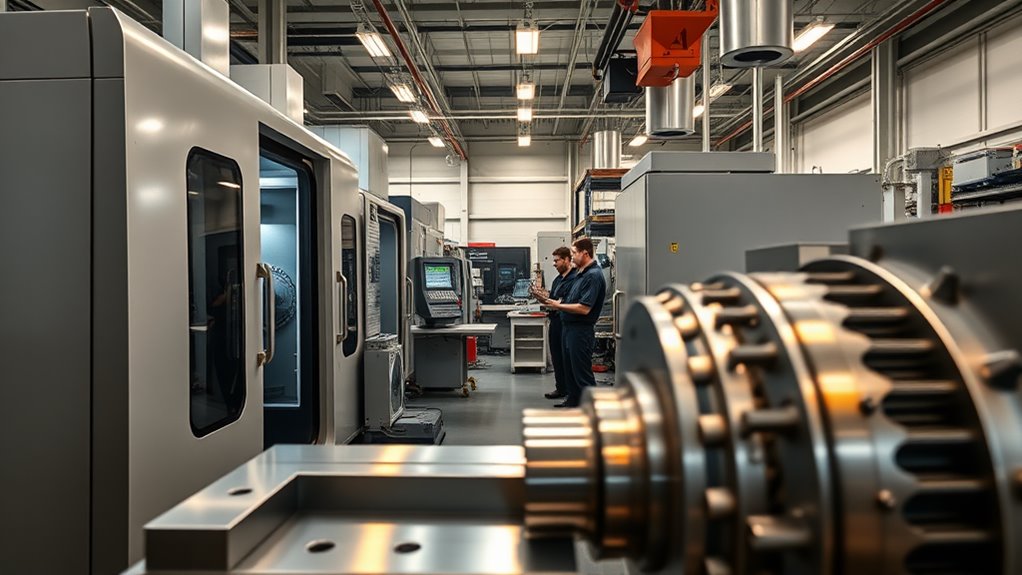Leading precision parts machining manufacturers distinguish themselves through their adoption of advanced technologies like CNC and additive manufacturing, which enhance precision and efficiency. Robust quality control measures, including adherence to ISO standards, guarantee consistent product quality. Additionally, customization capabilities allow manufacturers to meet diverse client specifications effectively. Their commitment to customer service and operational efficiency further strengthens their market competitiveness. Further examination reveals additional differentiators among these industry leaders.

Overview of Precision Parts Machining Manufacturers
The landscape of precision parts machining manufacturers is characterized by a diverse array of companies, each specializing in various aspects of machining technology. These manufacturers are essential players in the supply chain, adept at integrating manufacturing innovations to enhance productivity and quality. Recent industry trends reveal a shift toward automation and smart manufacturing, which allow companies to optimize processes and reduce turnaround times. Adopting advanced materials and cutting-edge techniques further distinguishes manufacturers in this competitive market. Companies that effectively leverage data analytics, predictive maintenance, and real-time monitoring exhibit superior operational efficiency and quality assurance. As businesses navigate evolving client demands and technological advancements, understanding these dynamics is vital for stakeholders seeking to evaluate and select ideal machining partners.
Key Technologies Employed in Precision Machining
Although precision machining encompasses a wide range of techniques and technologies, certain key innovations stand out as transformative in enhancing the efficacy and accuracy of machining processes. Central to these advancements is CNC technology, which enables unparalleled precision through automated control of tools and machinery. This technology allows for complex geometries and repeatability that were once unachievable. Complementing CNC capabilities, additive manufacturing introduces a layer of versatility by enabling the construction of intricate parts layer by layer, thereby minimizing material waste and allowing for rapid prototyping. Together, these technologies facilitate high precision and efficiency, thereby reshaping methodologies and expanding the potential applications in industries such as aerospace, automotive, and medical devices. The integration of these innovations is essential for maintaining a competitive edge in precision parts machining.
Quality Control Measures and Certifications
Quality control measures and certifications play a critical role in ensuring that precision parts meet stringent industry standards and customer expectations. Leading manufacturers implement robust inspection processes throughout the production cycle to detect defects and maintain dimensional accuracy. These inspection processes often employ advanced methodologies, such as statistical process control, to monitor production metrics continuously. Additionally, adherence to established certification standards, such as ISO 9001 or AS9100, reinforces a manufacturer’s commitment to quality management systems. Compliance with these standards requires regular audits and process validations, ensuring consistent output that meets both regulatory and client-specific requirements. By investing in quality control and obtaining relevant certifications, manufacturers differentiate themselves in a competitive market, bolstering client trust and satisfaction.
Customization Capabilities and Flexibility
Customization capabilities and flexibility are essential factors when evaluating precision parts machining manufacturers. The availability of tailored design options, adaptive manufacturing techniques, and quick turnaround times can greatly influence a company’s ability to meet specific customer requirements. Analyzing these aspects allows for a clearer understanding of how manufacturers can align their services with client needs.
Tailored Design Options
When evaluating precision parts machining manufacturers, the availability of tailored design options emerges as a critical factor influencing client satisfaction and project success. Manufacturers distinguished by their capacity for customization often provide an array of tailored materials that cater to specific industry requirements. This approach facilitates design versatility, allowing clients to refine specifications based on performance criteria and application nuances. Further, effective communication channels and iterative design processes enhance the manufacturability of complex geometries and unique functionalities. Manufacturers that embrace advanced software solutions and flexible tooling systems demonstrate superior adaptability, enabling them to align production capabilities with evolving client needs. Ultimately, such tailored design options serve as a pivotal consideration in selecting a precision parts machining partner that best meets individual project demands.

Adaptive Manufacturing Techniques
As manufacturers endeavor to remain competitive in an ever-evolving market, the implementation of adaptive manufacturing techniques becomes increasingly essential. These techniques leverage additive processes, enabling the production of complex geometries that traditional subtractions methods cannot achieve. This flexibility allows manufacturers to respond to unique client specifications rapidly, facilitating custom solutions without extensive retooling. Additionally, adaptive approaches enhance workflow optimization by minimizing waste and maximizing resource efficiency. By integrating real-time data analytics into the production line, manufacturers can dynamically adjust operations to meet fluctuating demand while maintaining stringent quality controls. Consequently, those who adopt these practices position themselves favorably in the landscape of precision parts machining, highlighting their capabilities in customization and responsiveness to client needs.
Quick Turnaround Times
Quick turnaround times in precision parts machining have become a critical factor for manufacturers aiming to meet client expectations in an increasingly competitive landscape. The ability to achieve rapid production while ensuring high-quality standards is a distinguishing characteristic among leading manufacturers. Effective process optimization and advanced technology enable these companies to reduce lead times considerably, thereby enhancing deadline adherence. Additionally, customization capabilities play a pivotal role; manufacturers that can swiftly adapt design specifications without compromising efficiency stand out in the market. By employing flexible production techniques and maintaining robust supply chain management, these manufacturers not only fulfill immediate client demands but also foster long-term partnerships, ultimately elevating their industry standing and operational resilience.
Customer Service Approaches and Support
A thorough evaluation of customer service approaches in precision parts machining reveals a notable diversity in support strategies among manufacturers. Some prioritize responsive customer feedback mechanisms, actively soliciting client input to enhance service delivery. Others employ extensive support channels, including live chat, phone consultations, and dedicated account managers, ensuring timely resolutions and fostering strong client relationships. Additionally, manufacturers vary in their use of customer relationship management (CRM) systems, which streamline inquiries and maintain detailed records of client interactions. The alignment of these strategies with client expectations greatly impacts customer satisfaction levels. Ultimately, an effective customer service framework is essential for manufacturers aiming to differentiate themselves in a competitive landscape, demonstrating a commitment to continuous improvement and client engagement.
Case Studies: Success Stories From Leading Manufacturers
Success stories from leading manufacturers in precision parts machining exemplify the effective application of innovative strategies and robust operational frameworks. One notable case is a manufacturer that achieved significant success milestones by integrating advanced automation technologies into its production line. This shift not only streamlined operations but also reduced cycle times by 30%. Another case highlights a firm that implemented cutting-edge additive manufacturing techniques, allowing for the creation of complex geometries previously deemed infeasible. This innovative approach led to increased market competitiveness and expanded client portfolios. Collectively, these examples underscore how leveraging innovative technologies can drive operational efficiency, enhance product precision, and ultimately position manufacturers favorably within an increasingly globalized market landscape, fostering sustainable growth and adaptability.
Frequently Asked Questions
How Do Machining Manufacturers Ensure Data Security During Production?
Machining manufacturers implement rigorous data security measures during production, utilizing advanced data encryption techniques and strict production protocols to safeguard sensitive information. This thorough approach mitigates risks associated with unauthorized access and guarantees the integrity of operational data.
What Environmental Practices Do Leading Manufacturers Adhere To?
Leading manufacturers prioritize sustainable practices by implementing strategies for waste reduction, optimizing resource usage, and adopting eco-friendly technologies. These initiatives contribute to minimizing environmental impact while enhancing operational efficiency in precision parts machining processes.
How Do Manufacturers Handle Supply Chain Disruptions?
Manufacturers employ strategic supply chain management to mitigate disruptions, utilizing robust disruption strategies such as diversified sourcing, advanced forecasting techniques, and enhanced communication channels to maintain operational continuity and minimize risk during unpredictable events.
What Is the Typical Lead Time for High-Precision Parts Production?
Lead time for high-precision parts production varies considerably, influenced by factors such as material availability, production efficiency, and complexity of design. Manufacturers optimize these elements to minimize delays and enhance overall operational effectiveness in response to market demands.
Which Industries Benefit Most From Precision Parts Machining Services?
Industries including aerospace applications, medical devices, automotive components, and industrial CNC machinery greatly benefit from precision parts machining services. These sectors demand stringent tolerances and high-quality components to guarantee performance, safety, and reliability in their applications.